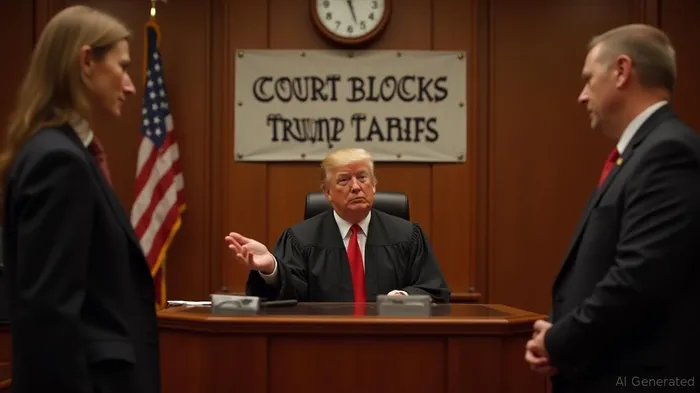Court Blocks Trump Tariffs Citing Illegal Use of Emergency Powers
The Court of International Trade, situated in New York, delivered a landmarkLARK-- ruling late Wednesday, asserting that President Donald Trump had overstepped his authority by employing a 1977 law to implement tariffs. This decision has introduced a significant hurdle into Trump's tariff plans, which were a key component of his economic strategy. The court's ruling was unanimous, with a panel of three judges—appointed by Ronald Reagan, Barack Obama, and Trump himself—concluding that Trump's use of the International Economic Emergency Powers Act to impose import levies on numerous countries was illegal.
The Trump administration is expected to appeal the decision and may also seek a stay of the ruling or request the Supreme Court to review the matter. Oregon Attorney General Dan Rayfield praised the court's decision as a victory for working families, small businesses, and everyday Americans. He criticized Trump's tariffs as unlawful, reckless, and economically devastating, citing retaliatory measures, inflated prices on essential goodsWTRG--, and an unfair burden on American families, small businesses, and manufacturers.
The ruling has far-reaching implications for the Trump administration's tariff plans. While the president has other legal avenues to impose tariffs, and Congress also has the authority to do so, Trump's strategy relied heavily on the concept of an emergency to pursue his tariff-focused economic agenda. The reasons for the tariffs have varied widely, from economic matters to border security, drug trafficking, and other issues.
The court's decision increases uncertainty and represents a setback for the administration's tariff plans. However, it may not change the final outcome for most major U.S. trading partners, as the administration can impose tariffs under other legal authorities, such as Section 301 of the Trade Act of 1974. This process, however, is more time-consuming.
The ruling has also highlighted the broader impact of Trump's tariff policies on the global trading system. The variety of moves and countermoves by U.S. trading partners has thrown the entire global trading system into disarray. The uncertainty has left many economists and consumers worried that the economy could slide into recession, although this has not happened yet.
The legal challenges, including those over Trump's immigration and other policies, have left the administration in a defensive position. The outcome may well be tariffs that are higher than at any time since the 1930s but not at the draconian levels Trump once promised. The political implications are also significant, as drawn-out battles over policies that poll badly with voters could unsettle some in the GOP at a time when Congress is seeking to pass a massive tax cut and spending bill by July 4. This could make life uncomfortable for Republicans facing midterm elections in 2026, further limiting Trump's agenda.
The court's decision has also brought to light the role of a small, family-run wine company in challenging Trump's tariffs. Behind the monumental court ruling that blocked most of Trump's tariffs is a small wine company run by a father-and-daughter duo. This highlights the broader impact of the court's decision on various sectors of the economy.

Quickly understand the history and background of various well-known coins
Latest Articles
Stay ahead of the market.
Get curated U.S. market news, insights and key dates delivered to your inbox.



Comments
No comments yet